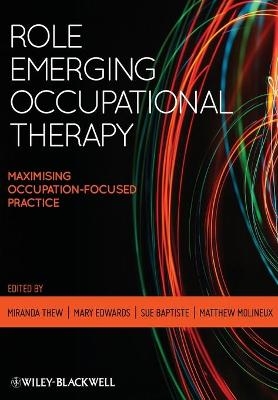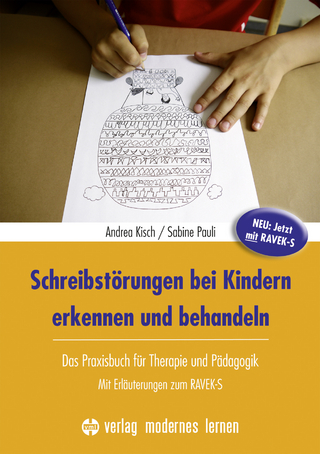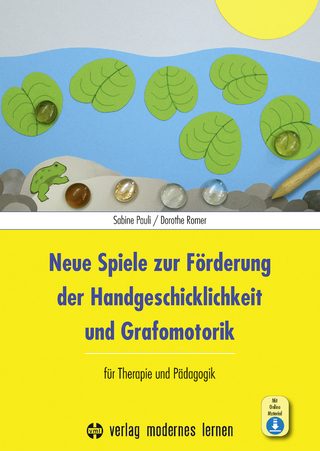
Role Emerging Occupational Therapy
Wiley-Blackwell (Verlag)
978-1-4051-9782-3 (ISBN)
The book affords the reader an opportunity to explore how occupation focused practice can be applied to a wide variety of settings and circumstances in order to improve the health and well-being of a diverse range of people. Chapters cover relevant theory as well as offering practical guidance with examples drawn from the experiences of university educators, occupational therapists, setting/service providers and students.
The book describes, explores and discusses both the potential and ramifications of role emerging practice on the occupational therapy profession and offers a vision for the future of the profession that reflects current occupational, social and health needs.
Miranda Thew (MSc, BHSc, Dip COT, SROT, CMT) has had many years experience in co-ordinating role emerging placements for a full cohort of occupational therapy students. She has written various articles and is regularly asked to provide support and guidance to others looking to establish such placements for their students. She also contributed to the College of Occupational Therapists guidance document appertaining to such placements. She currently works as a Senior Lecturer in Occupational Science and Occupational therapy at Leeds Metropolitan University. She has edited and was a major contributor to a book on lifestyle management for health and social care professionals, this led to her contributing and being seconded to human resources and health safety and wellbeing team at the university. She regularly is invited to inspire local occupational therapists to think beyond well established roles and champion occupational therapy to a wider field. Mary Edwards (BScCOT, MHSc, OT Reg (Ont.)) has a Masters in Health Sciences and has had over 30 years of experience in the education of Student Occupational Therapists. For 6 years she has was the Professional Practice (Fieldwork Education) Coordinator for the McMaster University, School of Rehabilitation Sciences, Occupational Therapy Program. This involved developing new and supporting existing role emerging practice opportunities for students and therapists. She has also been a central influence in the McMaster University Program for Faculty Development for 26 years with a focus in teaching and learning in the clinical setting. Sue Baptiste (MHSc, OTReg(Ont), FCAOT) is a tenured full professor, since 1998, within the faculty of the School of Rehabilitation Science at McMaster University, Hamilton, Ontario, Canada. She is also a past Assistant Dean for the Occupational Therapy program, having led the process of curriculum development prior to starting the entry level Masters program in 2000. Currently, she is the incoming President of the Canadian Association of Occupational Therapists and is committed to the development of the occupational therapy profession as it confronts a new era of practice opportunities in multiple contexts. She has consulted around the world in areas of chronic pain, client-centred practice, occupation-centred practice, problem-based learning (PBL), faculty development, curriculum development and curriculum reform. Sue enjoys leading workshops to support continuing professional development and competence as well as supporting organizations through the facilitation of strategic and operational development. Sue has explored the notion of spirituality in practice, and in one's personal life , and has focused particularly upon culture and spirituality in her teaching. Sue is concentrating her research efforts in gaining an in-depth understanding of the processes of acculturation and diaspora by working with internationally educated health professionals to facilitate their transition to a new culture and entry to professional practice. Matthew Molineux (BOccThy, MSc, PhD) has worked as an occupational therapist in both Australia and the United Kingdom, and has worked in a number of settings, including hospitals, primary care, rehabilitation, prison, and for many years in higher education. He is passionate about occupation based practice and is known for encouraging, and sometimes challenging, occupational therapy students and practitioners to reflect on the extent to which their practice is occupationally focused. He feels strongly that new and emerging practice opportunities provide a chance to truly demonstrate the impact occupation can have on individuals, groups and communities.
Acknowledgements. Preface.
Notes on contributors.
Part I: Background to OT, and philosophy of OT and emergence/re-emergence of occupation focussed practice.
1 Emerging occupational therapy practice: Building on the foundations and seizing the opportunities (Matthew Molineux & Sue Baptiste).
2 Models of role emerging placements (Mary Edwards & Miranda Thew).
Part II: Current examples of emerging practice for occupational therapists.
3 Successful role emerging placements: It is all in the preparation (Yvonne Thomas & Sylvia Rodger0.
4 The student experience of a role emerging placement (Philippa Gregory, Lydia Quelch & Elisha Watanabe).
5 Promoting well-being in a large organisation: Challenges and opportunities (Miranda Thew).
6 An occupational perspective of a disability-focused employment service (Sally Hall).
7 Promoting occupational therapy in a community health centre (Barry Trentham & Lynn Cockburn).
8 Occupational therapy: Can it make a difference in community cardiac failure? (Emma Brown & Barbara Gurney).
9 Community development (Deborah Windley).
Part III: Part Three Future of the profession.
10 Using policy and government drivers to create role emerging opportunities (Lori Letts & Julie Richardson).
11 The way forward? (Sue Baptiste & Matthew Molineux).
Index.
| Verlagsort | Hoboken |
|---|---|
| Sprache | englisch |
| Maße | 173 x 244 mm |
| Gewicht | 318 g |
| Themenwelt | Medizin / Pharmazie ► Physiotherapie / Ergotherapie ► Ergotherapie |
| ISBN-10 | 1-4051-9782-X / 140519782X |
| ISBN-13 | 978-1-4051-9782-3 / 9781405197823 |
| Zustand | Neuware |
| Informationen gemäß Produktsicherheitsverordnung (GPSR) | |
| Haben Sie eine Frage zum Produkt? |
aus dem Bereich


